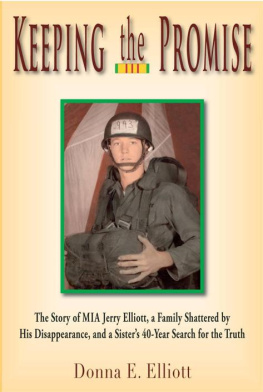KEEPING the PROMISE
The Story of MIA Jerry Elliott,
a Family Shattered by His Disapearance,
and His Sisters 40-Year Search for the Truth
Donna E. Elliott

KEEPING THE PROMISE
2010 William R. Berry
Published by Hellgate Press
All rights reserved. No part of this publication may be reproduced or used in any form or by any means, graphic, electronic or mechanical, including photocopying, recording, taping, or information and retrieval systems without written permission of the publisher.
Hellgate Press
PO Box 3531
Ashland, OR 97520
email: info@hellgatepress.com
Editor: Harley B. Patrick
Cover design: L. Redding
Back cover photo: Rita Ward
Library of Congress Cataloging-in-Publication Data
Elliott, Donna E., 1969
Keeping the promise : the story of MIA Jerry Elliott, a family shattered by
his disapearance, and his sisters 40-year search for the truth / Donna E.
Elliott ; editor Harley Patrick. -- 1st ed.
p. cm.
ISBN 978-1-55571-670-7
1. Elliott, Jerry William, 1948- 2. Vietnam War, 1961-1975--Missing in
action--United States. 3. Elliott, Donna E., 1969- I. Patrick, Harley B. II.
Title.
DS559.8.M5E45 2010
959.70438--dc22
2010002220
Printed and bound in the United States of America
First edition 10 9 8 7 6 5 4 3 2 1
This book is dedicated to my son...

Happy 40th Birthday, Randy!

Naval Chaplain Ray Stubbe (standing) holds a field service for Marines during the Battle of Khe Sanh, which claimed the lives of over four hundred U.S. Army, Marine, Navy, and Air Force soldiers between January 20 and March 31, 1968. Stubbe recently donated over four hundred items to the Wisconsin Veterans Museum; included among the items was the brass crucifix shown in the photo. Photo credit: Dick Swanson.
We can never forget our pastwe are unable to do so...The well-wishers, those who tell us to, just dont understand. How could they?
Chaplain Ray Stubbe
Contents
Acknowledgments
I wish to recognize those who sustained me as I rambled through a labyrinth of potent, repressed memories. The journey was painfully unpredictable, but family and friends endured my mood swings and loved me anyway. Thank you all, I couldnt have completed this book without your much-needed support.
I sincerely acknowledge all the Vietnam veterans who provided me with information and esprit de corps, especially the 268th Pathfinders, the 282nd Black Cats, my Khe Sanh vet brothers, and the Run For The Wall family.
Special thanks to Anne Perry for her professional language skills and endearing encouragement. Heartfelt appreciation to Mick Powner for significant suggestions and proofreading copy as if he were breaking code. Last, but not least, I would like to thank my writing coach Sheila Cosper. Her encouragement convinced this reluctant writer that not only should the accounting process of my MIA brother be told, but there was also a valid need to chronicle the corrosive effects his situation placed on the Elliott family. Perhaps, as a result of sharing our story, history will not be repeated.

The MISSING MAN TABLE: The six empty places set at this table represent the brave men and women from each of the five servicesArmy, Navy, Marines, Air Force, Coast guardand civilians, who are missing from the vietnam War.
Foreword
It is the dead who make the greatest demands on the living, and the return of our war dead is no exception. The bodies of those that perish in battle hold significance far beyond their mere physical properties. These bodies represent sacrifice, honor, and a pledge fulfilled to the people and government of the United States of America.
The dead themselves do not demand a proper burial, but the safe return of their remains is of paramount importance to the living. The survivors of the slain soldier need those remains to bring their grief to closure. We as a nation need to mourn our soldiers collectively and individually. Thus will soldiers risk their own lives to recover the bodies of the slain during and after a battle. The U.S. military follows a strict code of conduct concerning the retrieval of dead warriors and millions of dollars are spent every year to bring the fallen back home, with proper honors being rendered.
But what of those that are lost in battle without a full accounting? What of those Missing-In-Action (MIA) who left behind no body, no information, no hints as to their safety or death? What of those who leave behind only questions? For the families of these MIAs, the mourning never stops, and closure never comes. Jerry Elliott, a member of the 282nd Assault Helicopter Company (AHC) Black Cat rescue mission that attempted to come to the aid of my beleaguered garrison in Khe Sanh village, disappeared during that fight. His whereabouts are to this day still unknown. Jerrys sister, Donna Elliott, has devoted her life and resources to finding answers to her brothers disappearance. This is the story that unfolds in Keeping the Promise. America must remain faithful to the promise we make to every soldier in the United States military, an agreement of honor that if something happens to them while serving our great nation in a foreign country, they will never be abandoned.
While writing my own memoirs about Vietnam, Expendable Warriors: The Battle of Khe Sanh and the Vietnam War, my research took me to the 282nd Black Cat website where I met Donna. Her indefatigable search for her brother Jerry, who was MIA in the same place and at the same time as my own story, opened up volumes of information about the Agony of Khe Sanhthe seventy-seven day siegethat was invaluable to me in writing the book. Since meeting Donna and becoming part of her journey to find her brother, I have learned and participated in my own small way in her story which she tells so elegantly in Keeping the Promise. She is an excellent chronicler, researcher, and more importantly, she fights the hard fight for what she knows is right.
Donna believes we Americans must never forget our Prisoners-of-War (POWs) and MIAs. By writing Keeping the Promise, her goal is to achieve national support for the search for not only her brother Jerry, but all of Americas POW/MIAs. The truth at the heart of Case 1000, and many, many other POWMIA cases, is that there is no truth...and if not yet, when?
What emerges from her description of Jerrys disappearance is the devastation of her family and her continuous fight with the POW/MIA bureaucracy to learn about his status. The reader immediately senses the clear image of Donna Elliott as the strongest of womenshe fought through physical and psychological barriers to not only live this story, but to write it.
Keeping the Promise will generate more questions than answers about the POW/MIA bureaucracyquestions that need to be raised again and again until there are clear answers. Every reader of this book will find within its pages a renewed dedication to seeking answers to the whereabouts of our missing soldiers, and a clear understanding of the toll that war extracts from the families of all our combatants. When each American demands a full and accurate accounting of every POW/MIA warrior where evidence indicates suspected enemy knowledge, then Donnas goal of seeking understanding to all the unanswered questions about her brother, and all of Americas POW/MIAs will have been accomplished.












